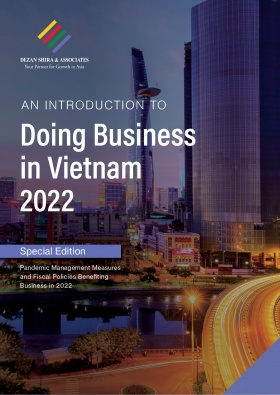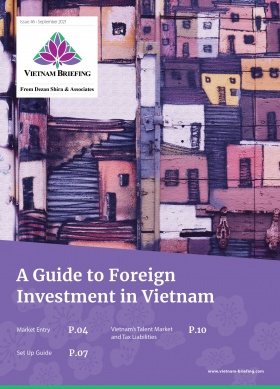Vietnam’s PM State Visit to Singapore Underscores Increasing Trade, Investment
- Vietnam’s Prime Minister’s visit to Singapore underlines strong Vietnam-Singapore ties with an emphasis on the digital economy.
- Singapore is has been one of the largest FDI investors in Vietnam for the past few years and remains poised to keep its place.
- Vietnam Briefing highlights the new agreements and trade between both countries, which will facilitate the business landscape for investors looking at Vietnam as an investment option.
On February 24, Vietnam President Nguyen Xuan Phuc made the first state visit to Singapore since the start of the COVID-19 pandemic in early 2020. During the three-day visit, Singapore and Vietnam signed five agreements and several memoranda of understanding (MoUs) on strengthening cooperation in defense, trade, and digital economy, intellectual property, and the social sector.
The highlight for investors was particularly the MoU on trade and digital economy cooperation, which covers areas such as the supporting of regional and global supply chain connectivity and continued trade flows between both countries in times of crisis.
It will also strengthen agri-trade cooperation by supporting information sharing and training on best practices, certification, and standards in the agriculture industry while aiming to foster greater collaboration between Singaporean and Vietnamese SMEs.
In addition, both countries signed an implementation work plan on intellectual property (IP), stemming from a memorandum signed in 2014. The cooperation will include exchanges in IP training and commercialization.
It also mentions the finalization of the proposed launch of a pilot Collaborative Search and Examination (CS&E) program. The program will foster exchanges of best practices between both sides’ intellectual property offices, among other initiatives.
For the investors, the program would prove beneficial as it enhances the enforcement of intellectual property rights which has been a major challenge for foreign investors, especially in the high-tech sector.
On the sidelines of the state visit, 29 business MoUs were signed between Vietnam’s provinces and businesses reaching a total registered capital of around US$11 billion. Vietnam and Singapore also reached an agreement on vaccine certificates, paving the way for the safe resurgence of commercial flights between the two countries.
These agreements and MoUs lay the groundwork for the recovery of the two countries’ economies as well as strengthen and open more opportunities for investors from Singapore to invest in Vietnam.
Investment and trade
According to the Ministry of Planning and Investment (MPI), Vietnam received US$19.74 billion of foreign investments in 2021. For the past two consecutive years in 2020 and 2021, Singapore has injected the largest amount of FDI into Vietnam. After Singapore was Japan which invested US$3.2 billion, followed by China, Hong Kong, and Taiwan. It’s important to note that several multinational companies invest in Vietnam invest through their Singapore operations. For example, US MNCs such as Intel and P&G, have invested in Vietnam through Singapore.
Foreign direct investment into Vietnam grew 7.2 percent from a year earlier to US$ 2.68 billion in January-February of 2022. Of that, Singapore was the top source of FDI pledges, followed by South Korea and China.
| Vietnam’s Top FDI Sources January – February 2022 | |
| Singapore | US$1.7 billion |
| South Korea | US$1.4 billion |
| China | US$538 million |
| Hong Kong | US$510 million |
Source: Ministry of Industry and Trade
In 2020, Singapore was also ahead of South Korea, Japan, and China, with an investment totaling US$8.99 billion.
Singapore ranked second out of 140 countries and territories that have investments in Vietnam. Bilateral trade turnover reached US$8.3 billion last year, up 23.3 percent compared to 2020. In January 2022, the figure reached US$783.9 million, an increase of 6.8 percent year on year.
There are currently around 2,700 approved projects by Singapore companies in Vietnam with a total registered capital of US$62.6 billion.
The Vietnam – Singapore Industrial Park (VSIP) in southern Binh Duong Province invested by Sembcorp Singapore and Vietnam’s Becamex IDC is another example of the cooperation between the two countries. Sembcorp has now developed 11 industrial zones with a total registered investment capital of about US$19 billion, generating an export value of about US$35 billion per year and creating jobs for nearly 300,000 workers in Vietnam.
Opportunities for Vietnam – Singapore trade
Expanding middle class
From now till 2023, Vietnam’s middle class is expected to grow at 9.2 percent – the fastest among Southeast Asian economies according to McKinsey & Company. By 2035, more than half of the country’s population is expected to reach middle-class status.
Meanwhile, according to Fitch Solutions household spending in the country has been projected to grow by 7 percent year-on-year in 2021, a leap from 0.8 percent in 2020. This signals a significant potential for consumer goods and services such as food & beverages, entertainment, lifestyle products, and services, especially in major cities like Ho Chi Minh City and Hanoi.
Strong bilateral relations
The relationship between Singapore and Vietnam has gone from strength to strength since the two countries established ties in 1973, with bilateral trade hitting US$22.7 billion in 2020. In addition, Vietnam and Singapore will mark the 50th anniversary of diplomatic relations and the 10th anniversary of the establishment of a strategic partnership in 2023.
Bilateral initiatives include the Singapore-Vietnam Connectivity Framework Agreement, which came into force in 2006, as well as the Vietnam Singapore Business Council (VSBC) from 2019.
In 2021, Singapore and Vietnam affirmed their cooperation at both a bilateral and ASEAN level. They also agreed to expand cooperation to new growth areas such as digital economy, cybersecurity, clean energy, sustainable development, and smart cities.
These affirmations have been recently translated into agreements and MoUs after the February 24 state visit, marking the commitment and confidence of both countries in prolonged cooperation.
FTA signatories
Vietnam has wide trade links, given its 14 free trade agreements (FTAs) with more than 50 economies around the world, including the EU-Vietnam Free Trade Agreement (EVFTA) and Regional Comprehensive Economic Partnership (RCEP).
Manufacturers venturing into Vietnam will therefore enjoy low tariffs and the ability to boost their exports to top markets such as the EU, US, Japan, and Australia.
In addition, Vietnam continues to attract a significant amount of foreign direct investments (FDI). Despite COVID-19, Vietnam drew over US$28.5 billion in foreign investments in 2020, signaling investors’ long-term commitment to and confidence in the market.
Both Vietnam and Singapore are signatories to nine FTAs and are the only two ASEAN countries that have signed FTAs with both the EU and the UK. Additionally, the two economies are highly complementary rather than competitive, enhancing the prospects of bilateral cooperation in penetrating the EU and UK markets.
The above factors allow the two countries to utilize their capabilities to cooperate in exploiting the cumulative origin mechanism and jointly increase exports to third countries.
About Us
Vietnam Briefing is produced by Dezan Shira & Associates. The firm assists foreign investors throughout Asia from offices across the world, including in Hanoi, Ho Chi Minh City, and Da Nang. Readers may write to vietnam@dezshira.com for more support on doing business in Vietnam.
We also maintain offices or have alliance partners assisting foreign investors in Indonesia, India, Singapore, The Philippines, Malaysia, Thailand, Italy, Germany, and the United States, in addition to practices in Bangladesh and Russia.
- Previous Article Why Vietnam Remains an Attractive Destination for US Businesses
- Next Article Personal Income Tax in Vietnam: Deadlines, Requirements, and Preparation







